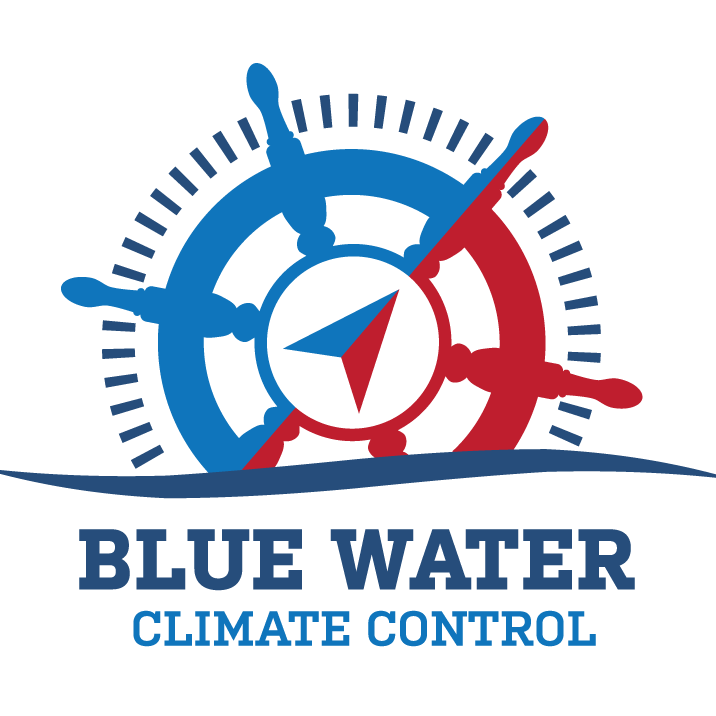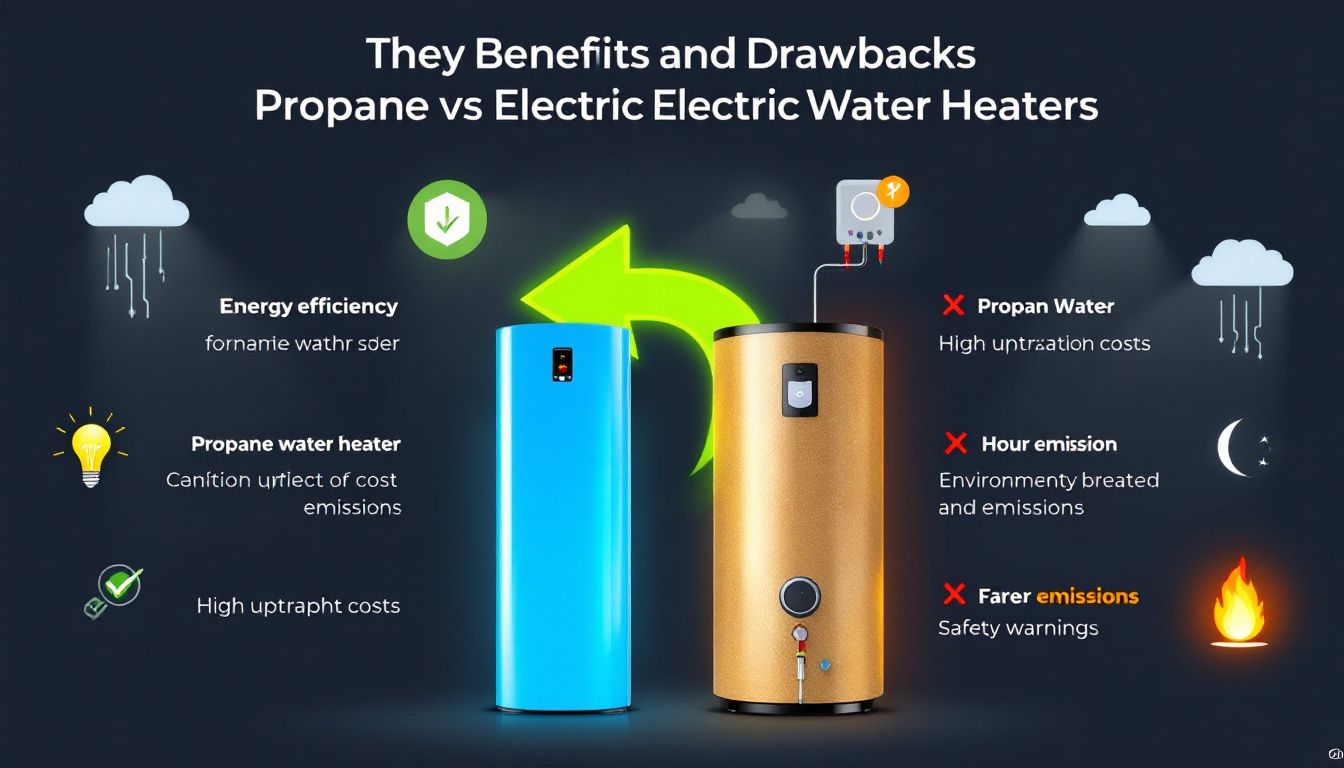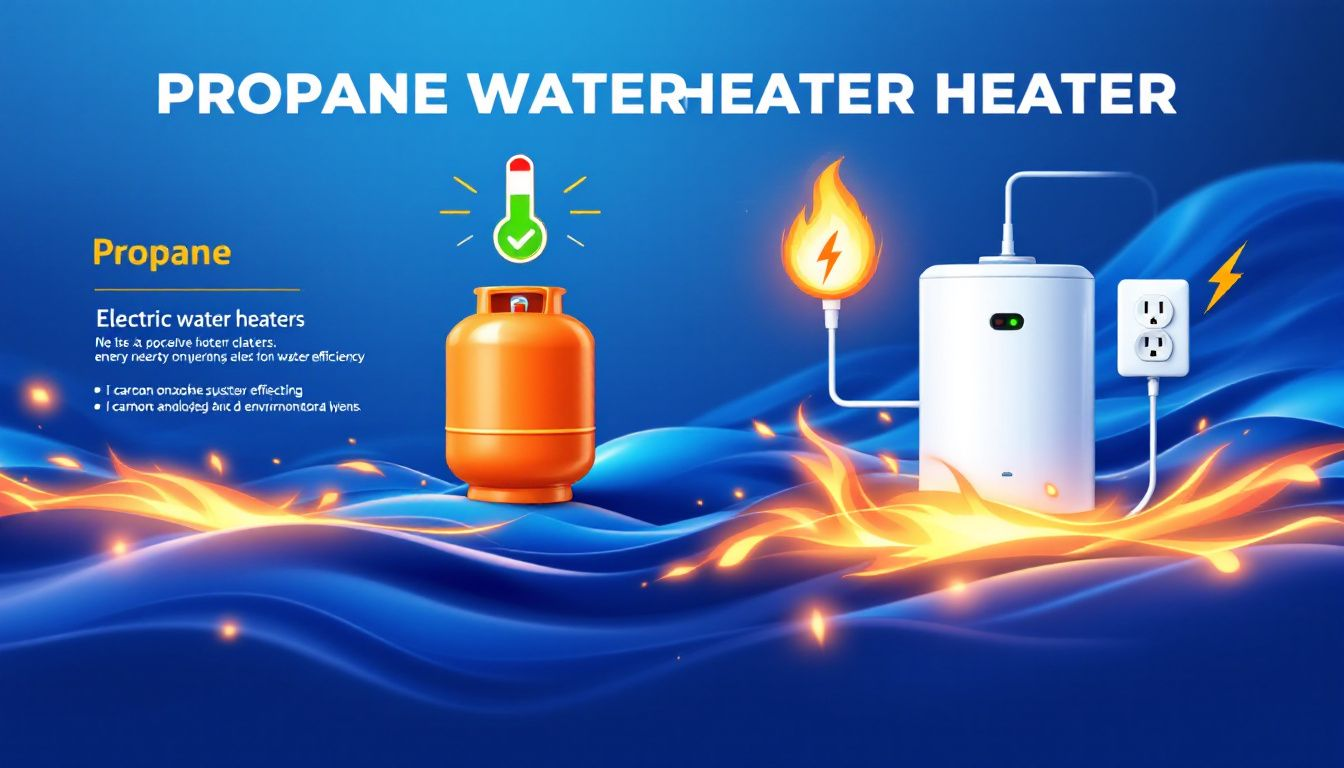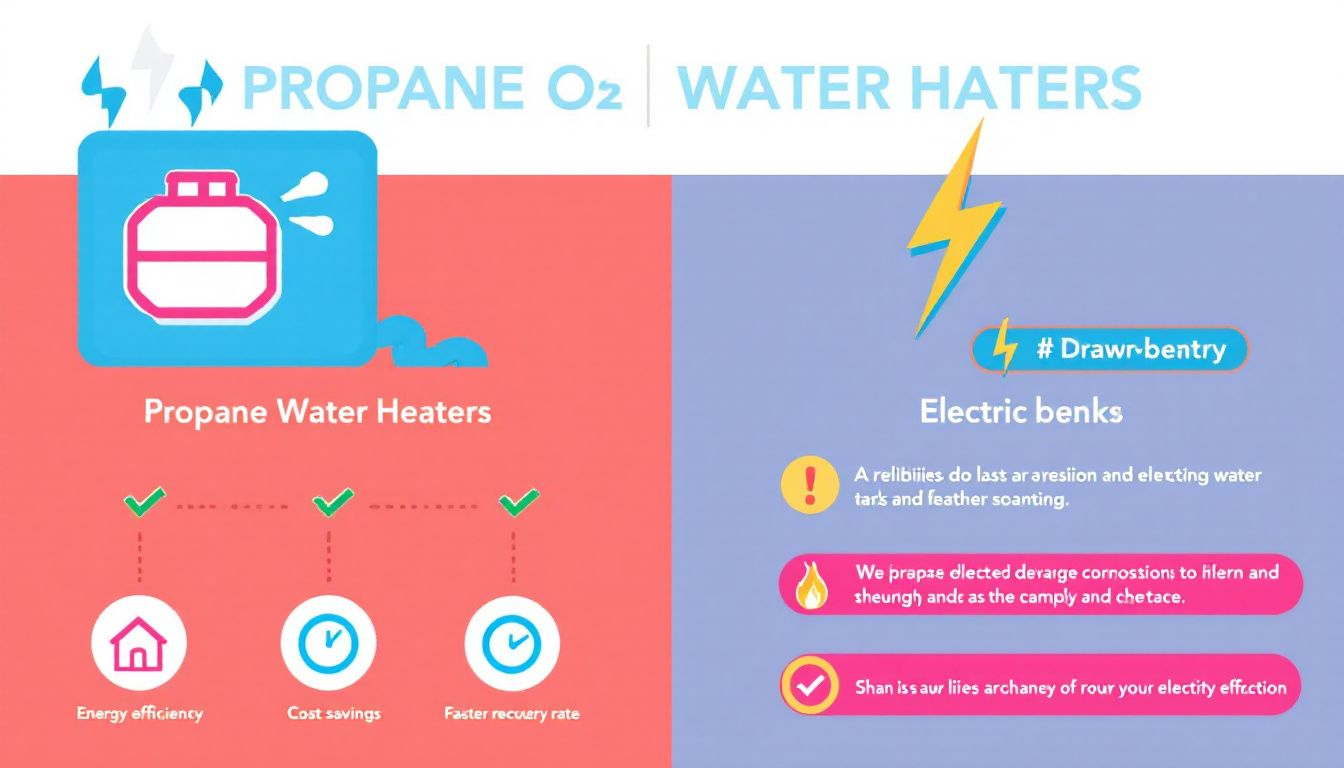Propane vs Electric Water Heater: Which Is the Best Choice for Your Home?
Are you wondering whether to choose a propane vs electric water heater for your home? This article will compare the key aspects, such as cost, energy efficiency, installation, and performance, to help you make an informed decision.
Key Takeaways
Propane water heaters heat water faster and use about 30% less energy than electric models, but electric units are cheaper to install initially.
While electric heaters have a higher efficiency rating, the overall environmental impact is greater due to how electricity is generated, often from fossil fuels.
Choosing the right water heater depends on your hot water needs, budget, and space, as well as considering both immediate costs and long-term operating expenses.
Quick Links:
Overview of Propane and Electric Water Heaters
Water heaters are crucial for daily tasks like showers, washing dishes, and laundry. The two most common types of water heaters are electric and gas, with the latter using either natural gas or propane. Electric water heaters, powered by electricity, offer a straightforward option for many households.
Gas water heaters, on the other hand, are available in both tankless and tank-type models, as are electric water heaters. Propane water heaters heat water faster than electric models, known for their superior heating capabilities. However, electric water heaters are generally less expensive to install, which can be a significant factor for budget-conscious homeowners. A drawback of electric models is their dependence on power; they won’t function during outages, which can be inconvenient.
When choosing between gas and electric water heaters, consider factors like safety, space, convenience, cost, and energy efficiency. Each type has its strengths and weaknesses, making the choice dependent on your specific household needs and circumstances.
Energy Efficiency Comparison
Energy efficiency plays a significant role in selecting a water heater. Propane water heaters use about 30% less energy than electric models, appealing to those aiming to reduce energy consumption. However, electric water heaters boast a higher efficiency rating of 98%, compared to propane heaters’ 85%. This means that while propane heaters use less energy overall, electric heaters convert more of their energy input into usable heat.
A standout feature of propane tankless water heaters is their superior energy efficient, up to 50% higher than electric models, including electric tankless water heaters. This efficiency translates to significant savings on energy costs over time, especially with a tankless heater.
Conversely, electricity generation is less efficient, with only 32% of energy in power plants converted into electricity, compared to propane’s 87% combustion efficiency. This inefficiency in electricity generation means that, despite their high efficiency at the point of use, electric water heaters can have a larger overall environmental impact.
Most U.S. electricity comes from fossil fuels like coal, significantly contributing to greenhouse gas emissions. Therefore, despite their operational efficiency, the energy source for electric water heaters can offset some environmental benefits.
Initial Costs
Regarding initial costs, electric water heaters generally have the advantage. A typical 40-gallon electric water heater costs between $950 and $1,500. The lower upfront cost makes electric models more attractive for budget-conscious buyers.
In contrast, gas water heaters, including propane models, tend to be more expensive to purchase and install. For example, a 40-gallon gas water heater can cost between $1,400 and $2,800 initially. This higher cost is partly due to the need for additional infrastructure such as gas lines and ventilation systems. Installation for gas units can be significantly higher, ranging from $1,000 to $2,000, compared to $700 to $1,000 for electric models.
Electric water heaters also have fewer components, which further contributes to their lower purchase price compared to gas models. While initial costs matter, weighing them against long-term operating costs and performance is crucial for an informed decision.
Long-term Operating Costs
Although electric water heaters have lower initial costs, long-term operating expenses can differ. Propane water heaters generally consume about 30% less energy than electric counterparts, resulting in lower operational energy costs. On average, a household using propane for water heating can save approximately $174 annually compared to using electric water heating.
However, propane water heaters can incur higher maintenance costs, potentially offsetting some savings. Electric water heaters often require more frequent replacements of heating elements, leading to increased long-term costs. In regions with high electricity rates, the long-term cost of running electric water heaters can be significantly higher compared to propane options.
Propane prices can fluctuate, impacting the overall operating costs of gas water heaters. Conversely, electric water heaters usually offer more stable costs due to consistent electricity pricing. These factors emphasize the importance of evaluating both immediate and long-term costs when selecting a water heater.
Installation Requirements
Installation requirements can vary significantly between electric and propane water heaters. Electric water heaters usually need less extensive infrastructure, making installation easier and often cheaper. Both types must comply with local plumbing codes, and permits may be required based on local building regulations.
Gas water heaters must be installed at least 18 inches above the floor to prevent fire hazards. Additionally, proper ventilation is crucial for gas units to avoid carbon monoxide buildup and ensure safe operation. Gas water heaters need a sediment trap to prevent debris from damaging the gas valve. These requirements can make gas water heater installation more complex and costly.
On the other hand, electric water heaters can be installed in more locations within the home due to fewer restrictions. This flexibility can be particularly beneficial for households with limited space. Homes seeking to maximize space can opt for tankless or demand-type water heaters, which don’t require a storage tank.
Heating Performance
Heating performance is vital when choosing between propane and electric water heaters. Propane water heaters are known for faster heating, producing more hot water in less time than electric models. Gas heaters, in general, heat quicker, an advantage during peak usage times.
Gas water heaters typically have higher recovery rates, producing around 30 to 40 gallons of hot water per hour, with some high-efficiency models reaching up to 50 to 70 gallons. In contrast, electric water heaters typically recover about 20 gallons per hour, taking longer to replenish hot water after use. This recovery rate difference is noticeable in larger households with high hot water demand.
Overall, propane water heaters excel in heating speed and recovery rate, ideal for those needing hot water quickly and in large quantities. This performance advantage can significantly impact the convenience and comfort of your daily routines.
Lifespan and Durability
The lifespan of water heaters varies significantly between types. A typical gas water heater lasts around 8-12 years. Proper care and maintenance can extend the longevity of electric water heaters, potentially outlasting gas counterparts. Regular maintenance, such as flushing the tank to remove sediment and checking the anode rod, is crucial for maximizing the lifespan of both propane and electric water heaters.
Regular maintenance can prevent costly repairs and extend your water heater’s life, maximizing your investment. Knowing the expected lifespan and maintenance needs of each type aids in making an informed decision.
Environmental Impact
Eco-conscious homeowners should consider the environmental impact of water heaters. Propane is one of the cleanest burning fossil fuels, emitting minimal greenhouse gases when combusted. Propane heaters emit significantly fewer carbon emissions than electric models with storage tanks. In fact, a propane water heater generates approximately half the carbon emissions compared to an electric water heater with a storage tank.
Using propane can reduce carbon emissions by up to 50% compared to an all-electric home. Renewable propane, derived from sustainable resources like agricultural waste, is being developed as an eco-friendly alternative. This innovation promises a future with reduced environmental impact for propane water heaters.
While electric water heaters are highly efficient, the source of their electricity often comes from fossil fuels, particularly coal, which contributes significantly to greenhouse gas emissions. For those looking to minimize their carbon footprint, propane water heaters present a compelling option.
Safety Considerations
Safety is paramount when it comes to water heaters. Gas water heaters require proper ventilation to prevent harmful fumes from entering the home. A carbon monoxide monitor detects lethal gas leaks, offering peace of mind for homeowners. Regular testing of the temperature and pressure relief valve prevents potential explosions. Keeping combustible materials away from gas water heaters avoids fire hazards. These safety measures underscore the importance of proper installation and maintenance for gas water heaters.
Electric water heaters, while generally safer in terms of emissions, still require regular maintenance to ensure safe operation. Secure electrical connections and leak-free units prevent accidents and extend appliance life.
Choosing the Right Water Heater for Your Home
Choosing the right water heater depends on specific hot water needs, energy efficiency, and available fuel sources. The water heater’s size must meet your family’s hot water demands. Keep water heater temperature settings below 120 degrees Fahrenheit to prevent scalding and bacterial growth.
The first-hour rating, indicating hot water usage from a full tank in an hour, is crucial when evaluating water heaters. Family size, budget, and space availability significantly influence satisfaction with a particular water heater type.
Carefully assessing these factors helps balance cost, performance, and environmental impact, ensuring you choose the right water heater.
Summary
In summary, both propane and electric water heaters have their unique advantages and drawbacks. Propane water heaters offer faster heating and lower long-term operating costs, while electric models are more affordable upfront and have higher efficiency ratings.
Ultimately, the best choice for your home depends on your specific needs, budget, and priorities. By considering factors such as energy efficiency, installation requirements, and safety, you can make an informed decision that ensures you have reliable and efficient hot water for years to come.
Frequently Asked Questions
Which type of water heater is more energy efficient?
Propane water heaters are typically more energy efficient overall, using about 30% less energy than electric models, even though electric water heaters have a higher efficiency rating. So, if you're looking to save on energy costs, propane might be the way to go!
What are the initial costs of electric vs. propane water heaters?
Electric water heaters are typically more budget-friendly to start with, costing between $950 and $1,500, compared to propane models, which can run from $1,400 to $2,800. So if you're looking to save upfront, electric might be the way to go!
How long do propane and electric water heaters typically last?
Propane water heaters usually last about 8-12 years, whereas electric ones can last longer, especially with good maintenance. Keeping up with regular checks can help extend their lifespan!
Which type of water heater has a lower environmental impact?
Propane water heaters typically have a lower environmental impact since they produce fewer carbon emissions than electric models, especially when you account for how electricity is generated. Choosing propane can be a greener option for your home.
Are there any safety concerns with propane water heaters?
Absolutely, safety is key with propane water heaters. Make sure to have proper ventilation, install a carbon monoxide monitor, and keep up with regular maintenance to stay safe.







